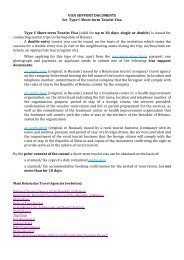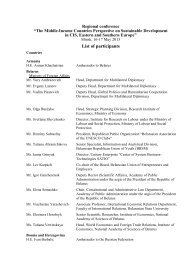A greater emphasison education cansubstantially reducechild deaths in allcountries and regionsover the years. The results from the fast trackscenario show substantially fewer child deathsas mother’s level of schooling rises. The modelalso shows that a greater emphasis on progressin education would substantially and continuallyreduce child deaths in all countries andregions, as a direct result of improvements ingirls’ education (table 4.2).India has the most projected child deathsover 2010–2015, almost 7.9 million, accountingfor about half the deaths among childrenunder age 5 in Asia. 7 In the final projectionperiod, 2045–2050, nearly 6.1 million childrenare projected to die under the base case scenariobut just half that many (3.1 million) under thefast track scenario.China has more people than India but is projectedto have less than a quarter (1.7 million)the number of child deaths over 2010–2015.And due to China’s advances in education,projections look optimistic under both scenarios.If China follows the fast track scenario, asseems likely, child deaths will decline to abouthalf a million by 2045–2050, less than a thirdof the current level.Projections are less optimistic for someother countries. Under the base case scenario,child deaths in Kenya, for example, wouldrise from about 582,000 in 2010–2015 toabout 1.6 million in 2045–2050. Under thefast track scenario, the number of deathsover 2045–2050 would drop to 371,000,much better, but not far below the level in2010–2015.The projected declines in child deaths reflectthe combined effects of better educatedwomen having fewer children and of fewerof those children dying. The projections alsoshow that policy interventions have a greaterimpact where education outcomes are initiallyweaker.These results underscore the importance ofreducing gender inequality, especially in educationand in low <strong>Human</strong> <strong>Development</strong> IndexTABLE 4.2Projected number of deaths of children under age 5, by education scenario, 2010–2015, 2025–2030 and2045–2050 (thousands)Country or regionCountry2010–2015 2025–2030 2045–2050Base case Base case Fast track Base case Fast trackBrazil 328 224 177 161 102China 1,716 897 871 625 526India 7,872 6,707 4,806 6,096 3,064Kenya 582 920 482 1,552 371Korea, Rep. 9 8 9 7 7Mali 488 519 318 541 150Pakistan 1,927 1,641 1,225 1,676 773South Africa 288 198 165 134 93RegionAfrica 16,552 18,964 12,095 24,185 7,495Asia 15,029 11,715 8,924 10,561 5,681Europe 276 209 204 196 187Latin America and the Caribbean 1,192 963 704 950 413North America 162 160 155 165 152Oceania 11 11 11 12 10Note: See Technical appendix at the end of this <strong>Report</strong> for a discussion of the base case and fast track scenarios.Source: Lutz and KC <strong>2013</strong>.90 | HUMAN DEVELOPMENT REPORT <strong>2013</strong>
(HDI) countries. Gender inequality is especiallytragic not only because it excludes womenfrom basic social opportunities, but alsobecause it gravely imperils the life prospects offuture generations.Enabling voice and participationIn the 1995 <strong>Human</strong> <strong>Development</strong> <strong>Report</strong>,Mahbub ul Haq highlighted that unless peoplecan participate meaningfully in the events andprocesses that shape their lives, national humandevelopment paths will be neither desirable norsustainable.Equitable and sustainable human developmentrequires systems of public discoursethat encourage citizens to participate in thepolitical process by expressing their viewsand voicing their concerns. People should beable to influence policymaking and results,and young people should be able to look forwardto greater economic opportunities andpolitical accountability. Exclusion from thisprocess limits people’s ability to communicatetheir concerns and needs and can perpetuateinjustices.Autocratic regimes impose restrictionsthat directly counter human development byrestraining essential freedoms. But even indemocracies, poor people and poor groups oftenhave limited access to information, voice orpublic participation. Poor people need to worktogether to effectively exercise their politicalvoice. Yet in many countries, organizationsrepresenting the poor are not supported butdiscouraged. Democracies can also extendaccountability from what is often a narrowconstituency of elites to all citizens, particularlythose who have been underrepresented inpublic discourse, such as women, youth and thepoor.Governments that do not respond to citizens’needs or widen opportunities for politicalparticipation risk losing their legitimacy.Dissatisfaction is on the rise in the Northand the South as people call for more opportunitiesto voice their concerns and influencepolicy, especially on basic social protection.According to a recent International LabourOrganization report, government dissatisfaction,measured by the Social Unrest Index, rosein 57 of 106 countries from 2010 to 2011. Thelargest increases were in countries of the North,followed by those in the Arab States and Sub-Saharan Africa. 9People in the North have been protestingagainst austerity measures and reductions inpublic spending and jobs, as in France, Greece,Italy, Spain and the United Kingdom. Citizenshave challenged governments to address thesocial consequences of their policies, pointingout that the burden of austerity is being bornedisproportionately by the poor and sociallydisadvantaged. 10 Other focuses of unrest haveincluded food prices, unemployment andpollution:• Rising food prices. Riots in response to highfood prices in 2008 challenged stability inmore than 30 countries in Africa and theArab States. 11• Unemployment and low wages. Workers aredemanding that governments respond totheir needs. The unemployed are voicingtheir dissatisfaction in many countries. 12 InViet Nam strikes doubled in 2011 as workersstruggled to gain higher wages in the face ofinflation. 13• Environmental pollution. Mass protestsagainst environmental pollution are alsowidespread. Protesters in Shanghai, China,for example, fought a proposed wastewaterpipeline, 14 and in Malaysia local residentshave been opposing the constructionof a rare earth metal refinery in theirneighbourhood. 15Among the most active protesters are youth,in part a response to job shortages and limitedemployment opportunities for educatedyoung people. In a sample of 48 countries,youth unemployment was more than 20% in2011, well above the 9.6% overall rate. 16 Youthdiscontent in response to rising unemploymentis even more likely in areas with an educatedpopulation. 17 Education alters people’sexpectations of government and instils thepolitical skills and resources needed to challengegovernment decisions. This is not tosay that the educated have greater rights. Butunless governments give greater priority tojob creation, they are likely to face increasingyouth dissatisfaction as education coverageexpands (figure 4.1). 18At the same time, mobile broadband Internetand other modern technologies are openingDissatisfaction is on therise as people call formore opportunities tovoice their concerns andinfluence policy, especiallyon basic social protectionChapter 4 Sustaining momentum | 91
- Page 1 and 2:
WNSEHuman DevelopmentReport 2013The
- Page 3 and 4:
Human Development Report 2013The Ri
- Page 5 and 6:
Human Development Report 2013 TeamD
- Page 7 and 8:
Finally, the Report also calls for
- Page 9 and 10:
Heather Simpson, Ben Slay, Mounir T
- Page 11 and 12:
3.6 India’s Supreme Court issues
- Page 13 and 14:
OverviewOne of the most heartening
- Page 15 and 16:
and sustainability are fully incorp
- Page 17 and 18:
Without investment in people, retur
- Page 19 and 20:
opportunity to reap the full benefi
- Page 21 and 22:
Woods institutions, the United Nati
- Page 23 and 24:
IntroductionWhen developed economie
- Page 25 and 26:
leading economies—Brazil, China a
- Page 27 and 28:
comparable access to information, e
- Page 29 and 30:
mobile phones: cellular banking is
- Page 32 and 33:
“The political problem ofmankind
- Page 34 and 35:
BOX 1.1Fairness, macroeconomics and
- Page 36 and 37:
BOX 1.3Amartya Sen, Nobel Laureate
- Page 38 and 39:
FIGURE 1.1Income per capita is risi
- Page 40 and 41:
BOX 1.4Subjective indicators of wel
- Page 42 and 43:
FIGURE 1.4There is notable variatio
- Page 44 and 45:
FIGURE 1.6Most regions show declini
- Page 46 and 47:
Progress in humandevelopment achiev
- Page 48 and 49:
BOX 1.7Social competencies: human d
- Page 50 and 51:
TABLE 1.3Inequality and satisfactio
- Page 52 and 53: Not all countries havethe precondit
- Page 54 and 55: “When the music changes,so does t
- Page 56 and 57: BOX 2.1The South’s integration wi
- Page 58 and 59: FIGURE 2.1As a share of world merch
- Page 60 and 61: BOX 2.2Acquisitions by the South of
- Page 62 and 63: FIGURE 2.3Between 2000 and 2010, In
- Page 64 and 65: FIGURE 2.4Export earnings per capit
- Page 66 and 67: BOX 2.6Final assembly is about more
- Page 68 and 69: Instead of having a centreof indust
- Page 70 and 71: FIGURE 2.6Emerging market economies
- Page 72 and 73: Developing countriestrade more amon
- Page 74 and 75: “We cannot expect thatall nations
- Page 76 and 77: TABLE 3.1Selected developing countr
- Page 78 and 79: A common featureof countries thatha
- Page 80 and 81: More important thangetting prices r
- Page 82 and 83: BOX 3.5Eastern Europe and Central A
- Page 84 and 85: States have to beconscious that the
- Page 86 and 87: As countries develop,they tend to d
- Page 88 and 89: Having weathered theAsian financial
- Page 90 and 91: Providing publicservices that contr
- Page 92 and 93: Advancing health requiresmore than
- Page 94 and 95: Universal public healthand educatio
- Page 96 and 97: • China. The Minimum Livelihood G
- Page 98 and 99: “Each generation will reap whatth
- Page 100 and 101: concerns will make for a complex en
- Page 104 and 105: FIGURE 4.1Under the fast track scen
- Page 106 and 107: Around the worldpeople are calling
- Page 108 and 109: FIGURE 4.4Different environmental s
- Page 110 and 111: FIGURE 4.5Education policies can al
- Page 112 and 113: BOX 4.2China and Ghana: who benefit
- Page 114 and 115: FIGURE 4.8countries thus converge t
- Page 116 and 117: “Let us join hands to try tocreat
- Page 118 and 119: Areas of globalinternational concer
- Page 120 and 121: Addressing climatechange requires t
- Page 122 and 123: International governanceis increasi
- Page 124 and 125: BOX 5.2Jo Leinen, Member of the Eur
- Page 126 and 127: facilitates reserve investments and
- Page 128 and 129: Responsible sovereigntytakes the lo
- Page 130 and 131: FIGURE 5.1Under the accelerated pro
- Page 132 and 133: Good policymakingrequires greater f
- Page 134 and 135: A fair and less unequalworld requir
- Page 137 and 138: NotesOverview1 Atsmon and others 20
- Page 139 and 140: 25 Blinder 2006.26 UNIDO 2009.27 UN
- Page 141 and 142: which is 61.7 deaths per 1,000 live
- Page 143 and 144: ReferencesAbdurazakov, A., A. Minsa
- Page 145 and 146: urban_world_cities_and_the_rise_of_
- Page 147 and 148: Kamau, P., D. McCormick, and N. Pin
- Page 149 and 150: Labor Administration. Geneva: Inter
- Page 151 and 152: Human Development Report 2013The Ri
- Page 153 and 154:
Statistical acknowledgementsThe Rep
- Page 155 and 156:
Key to HDI countries and ranks, 201
- Page 157 and 158:
Human Development Report 2013The Ri
- Page 159 and 160:
Human Development Report 2013The Ri
- Page 161 and 162:
Human Development Report 2013The Ri
- Page 163 and 164:
Human Development Report 2013The Ri
- Page 165 and 166:
Human Development Report 2013The Ri
- Page 167 and 168:
Human Development Report 2013The Ri
- Page 169 and 170:
Human Development Report 2013The Ri
- Page 171 and 172:
Human Development Report 2013The Ri
- Page 173 and 174:
Human Development Report 2013The Ri
- Page 175 and 176:
Human Development Report 2013The Ri
- Page 177 and 178:
Human Development Report 2013The Ri
- Page 179 and 180:
Human Development Report 2013The Ri
- Page 181 and 182:
Human Development Report 2013The Ri
- Page 183 and 184:
Human Development Report 2013The Ri
- Page 185 and 186:
Human Development Report 2013The Ri
- Page 187 and 188:
Human Development Report 2013The Ri
- Page 189 and 190:
Human Development Report 2013The Ri
- Page 191 and 192:
Human Development Report 2013The Ri
- Page 193 and 194:
Human Development Report 2013The Ri
- Page 195 and 196:
Human Development Report 2013The Ri
- Page 197 and 198:
Human Development Report 2013The Ri
- Page 199 and 200:
Human Development Report 2013The Ri
- Page 201 and 202:
Human Development Report 2013The Ri
- Page 203 and 204:
Human Development Report 2013The Ri
- Page 205 and 206:
Human Development Report 2013The Ri
- Page 207 and 208:
Human Development Report 2013The Ri
- Page 209 and 210:
Human Development Report 2013The Ri
- Page 211 and 212:
Statistical referencesADB (Asian De
- Page 213 and 214:
Core features of the model pertinen
- Page 215 and 216:
Countries and HDI ranks in 2012 and
















